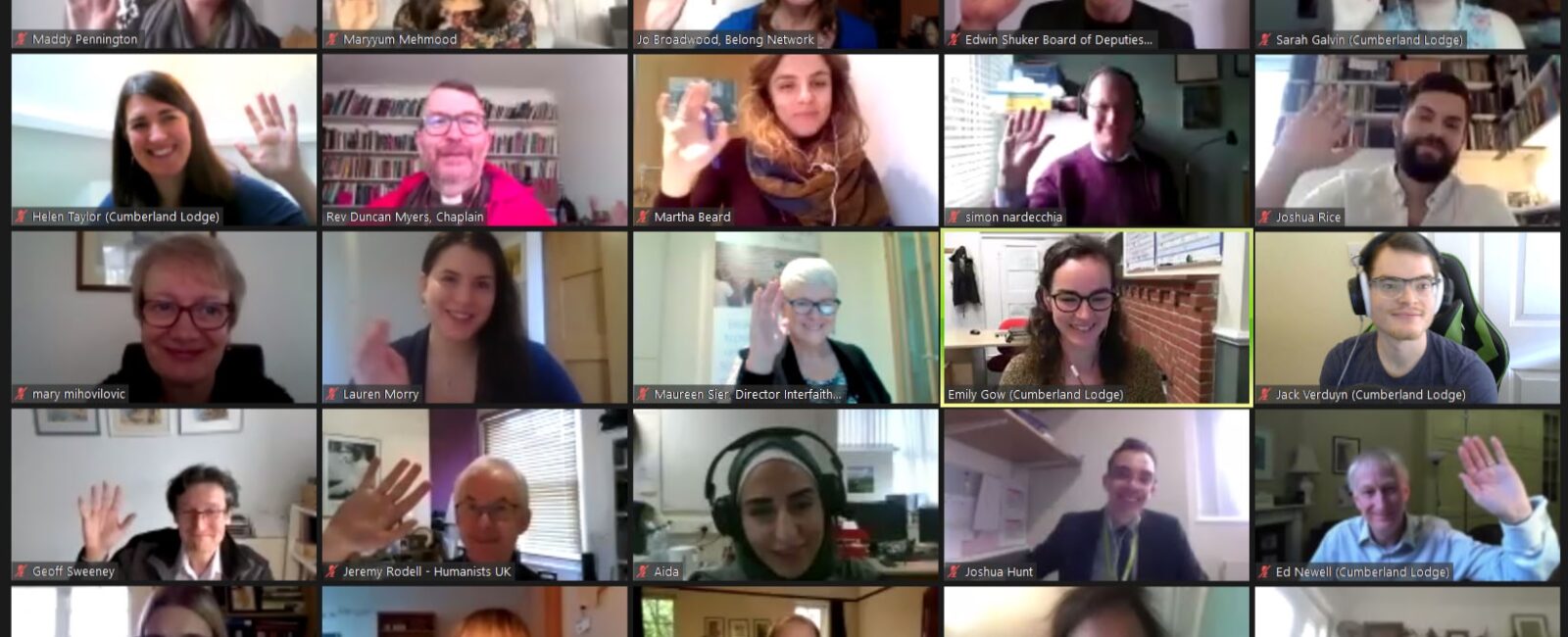In November 2020 a fascinating and inspiring series of conversations took place during the virtual Cumberland Lodge conference on Faith & Belief 2040. It was timely event – taking place during the COVID-19 pandemic, when societies all over the world are facing unprecedented economic and social struggles. The conference was split into four sessions. In this blog, I focus on the third session of the conference, which explored ‘Social Cohesion’ in relation to the UK’s changing faith and belief landscape.
This session looked into the work that can be done by people with different religious and non-religious beliefs, to promote a more cohesive and inclusive society. It was introduced by four guest panellists:
- Jo Broadwood (Chief Executive, Belong – The Cohesion and Integration Network)
- Madeleine Pennington (Head of Research, Theos)
- Dr Maryyum Mehmood (Centre Facilitator, University of Birmingham)
- Edwin Shuker (Board of Deputies, British Jews)
The discussions not only looked at current social cohesion issues but also tried to predict future developments, as far as 2040. The participants discussed their predictions for the year 2040 if positive measures aren’t implemented now, and what those measures might be in order to improve the outlook over the next two decades.
The guest panellists and conference participants had an open dialogue on this difficult issue, in a welcoming and inclusive environment. The views of people from different religious, social, racial and economic backgrounds were heard and respected. This is what I personally like about all Cumberland Lodge events – you are not afraid to be different, as you know you will be respected.
The problems stated
One of the speakers paid a lot of attention to outlining problematic divisions within British society in general, be that religious, social or racial. In 2019, the UK charity The Challenge published the British Integration Survey, which showed that 44% of Britons have no contact with people who have a different ethnicity, and 1 in 5 have no contact with people from a different social class. This speaker acknowledged that it is much easier for all of us to have any kind of relationship and connection with someone who reminds us of ourselves in colour, sexuality and beliefs. This is our comfort zone and listening to ‘others’ takes effort. This leads to less diverse social networks, in which people are less likely to think positively and sympathetically about different groups in society.
The global pandemic is playing an interesting role in social division. On one hand, as one of the presenters highlighted, ‘because of COVID-19, any opportunities for social mixing are severely curtailed’ and hence, so are opportunities for increasing the contact and exchange that can help to bridge divides. On the other hand, the recent report Britain’s Choice, by More in Common, shows that people are increasingly fed up with division. It shows us that society is ready to come together, even if it is mostly online at the moment.
So, what can unite us and what are the roles of faith-based communities in this process? In an age of increasing religious diversity and non-religious affiliation it is difficult to answer this question unequivocally. Both religious and non-religious beliefs will take new shapes over the next 20 years and we will be living in a different society by 2040.
Several speakers mentioned how essential it is to bring people together, by 2040, with regards to the climate crisis. When it comes to one’s own house and family, or one’s own nation or religious community, that is one thing, but the Earth is everyone’s business.
The COVID-19 pandemic has shown us that people can be brought together, across potential divides, in moments of crisis.
All the speakers agreed that we need to find ways to strengthen social cohesion and reduce divisions by 2040. Otherwise it will be extremely difficult to work together on the pressing issue of survival in the face of climate change.
Potential solutions presented
Although it is impossible to find a magic solution, various ideas were presented by speakers and participants for strengthening social cohesion over the next 20 years, in a more religiously diverse society.
As one of the speakers put it, and I completely agree, ‘you cannot change anything in the world around without changing, first of all, yourself’.
So, starting with us, we need to show greater understanding towards people who have different beliefs to our own. If we do that, we will be more likely to speak positively and warmly about ‘others’, which will help us to broaden our networks and outlook, and reveal more opportunities for inclusion.
A couple of speakers noted that it is crucial to learn the skill of having difficult conversations and that education has a key role to play in building social cohesion and reducing divisions in society. However, many people just don’t have the confidence for difficult conversations. Schools, both faith-based or non-faith, have a role to play in working with children from an early age, when their opinions and beliefs are still being formed. An appreciation of diversity and inclusion should be included in the curriculum, and children should be supported to gain the skills to communicate with other groups, even in the face of resistance or difficulty.
All the speakers in this webinar paid attention to the vital importance of community work in developing a more cohesive society. Better intergroup connections in the places where we live and work can help to bring different groups of people together. Some of the speakers suggested that it would be better to stop focusing on differences and just start to engage more in community projects together.
One idea I particularly liked, from our discussions in the breakout groups, was that ‘community engagement should not fetishise difference’.
That is why I also think that faith communities, irrespective of all the religious debates that go on between them, should help to bring people together through community work and work towards fostering social cohesion, especially in times of collective crisis, like during the current pandemic.
The goodness we can achieve together
One of the speakers put it beautifully: ‘We need inspiration’. We need to imagine what a better world might look like and we need roots in the present to be able to imagine it. ‘You cannot create what is not yet imagined. We need more stories about incredible people and projects which bring people together across a divide.’
As a filmmaker and storyteller, I am on the same page and I personally understand the scope we have to change the world by sharing other people’s inspiring stories.
In terms of good practice in supporting social cohesion, all of the guest speakers spoke a lot about community work. The current pandemic has shown us that kindness does exist, across the UK. One of the speakers noted that Britain is not as divided and polarised as some other countries. People have shown a desire to come together, irrespective of their differences, to support the most vulnerable members of society.
As another speaker put it: ‘Social cohesion is about inspiring coexistence and community, without diminishing differences but cherishing them’.
Not only has the role of community centres shifted during this crisis, to become food banks or shelters for the most vulnerable, but there are plenty of examples of religious buildings following this pattern. Many have taken their worship online because of lockdowns and restrictions, but repurposed their empty buildings at the same time. This is a great example of how, irrespective of faith or belief, we have the ability to be empathetic, to care and show humanity.
I cannot outline here all the amazing and inspiring examples of community and interfaith work that are being carried out across the UK, to help build social cohesion and nurture moral courage in young people, so I will just invite you to listen to this 15-minute podcast from Cumberland Lodge, which explores just some of them:
What still needs to be answered?
As one of the participants noted, such a notion as ‘social cohesion’ didn’t even exist 40-50 years ago, in many places around the world. So, the fact we are talking about it now is already progress. However, a lot of work has to be done in the direction of building a more cohesive society and we need to be sure that the bridges we build between different groups during the current pandemic don’t collapse due to lack of ongoing support.
Although we had several insightful presentations during this conference session, as well as fruitful discussions in the breakout groups, a number of questions remain unanswered. In my view, the following questions need further exploration, by either discussing them within our social networks or by simply having them in our thoughts:
- What is the practical role of faith groups in achieving social equality?
- How can you approach social cohesion if you are considered as one of the ‘others’ by majority groups?
- What can you do to support inclusion and raise awareness of different cultures and beliefs when you live in a very mono-cultural community?
- Some groups might have a fear of losing their identity if they mix with ‘others’. How can people address their insecurities and fears of not being respected?
- For non-religious members of society, are there any social ‘substitutes’ for religion, apart from humanism, that could be passed on to future generations?



